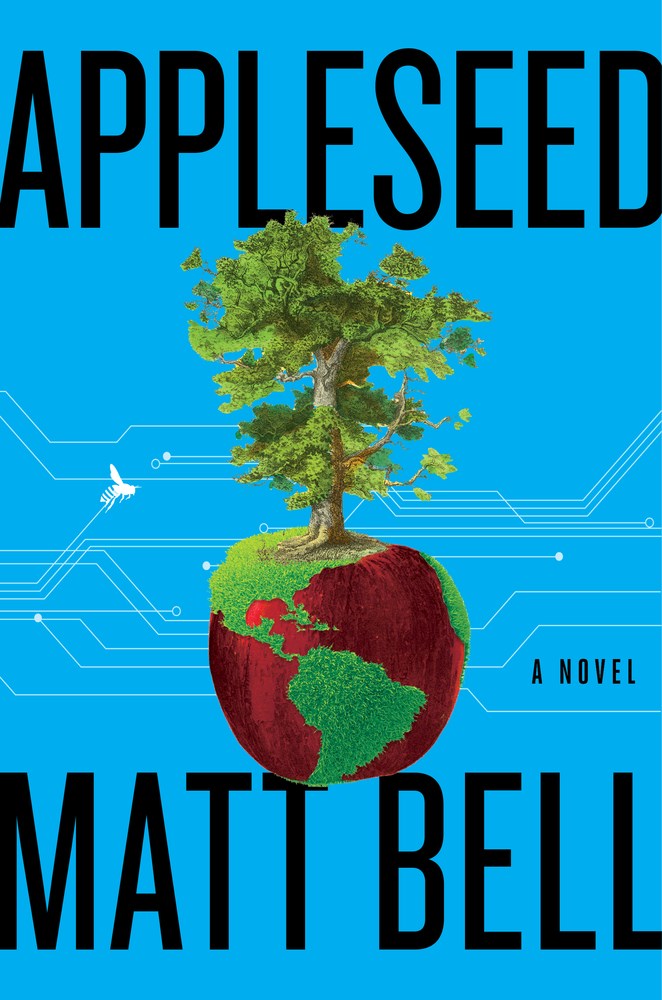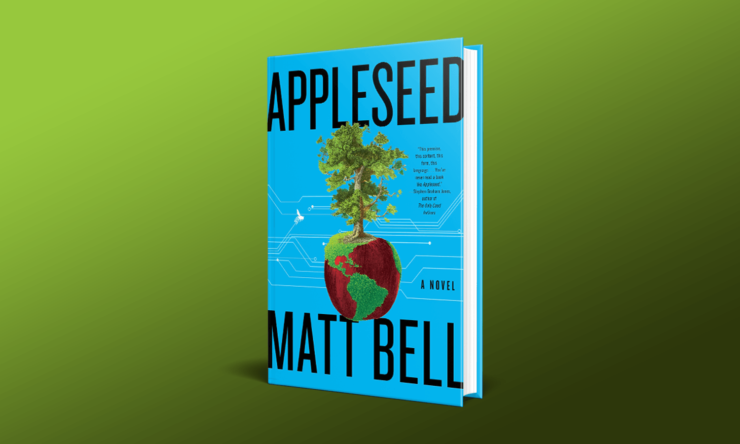Have you ever dug your hands down into real, rich dirt? Like say you’re gardening or planting a tree, and you push your hands down into layers of loam and crumbly black dirt, and you found roots, and bits of stone, and maybe some confused worms? And if you’re not wearing gloves—maybe you like the feeling of dirt on your hands—you can feel the strata of warm and cool earth as you push your fingers down and down and down? You can feel how far the sunlight reached? And then you have dirt in your cuticles and under your fingernails for hours no matter how much your scrub at them?
Reading Matt Bell’s Appleseed is like that.
This review’s going to be a little weird. I’ll try to give you the non-spoiler basics here in a paragraph, but I think to do this book justice I’ll need to free associate a little, and try to bring it home.
So, non-spoiler thoughts: This book is long, but more than earns its length. It’s rich and complex. Bell is able to swing, seemingly effortlessly, from sections that are thought experiments, to sections that are wrenchingly emotional. He weaves mythic figures and fantastical elements into realism absolutely seamlessly. Having said this, this might not be a book for everyone. It took me a while to read; I had to keep putting it down to mull. It also made me fairly panicky because it’s about, ummm, the end of current civilization? Somewhat? Which is a topic that dances my heart right out onto the floor at Studio 54, and makes my lungs fold up like card tables.
(Teen Edgelord Leah used to think it would be darkly interesting to live through the end of the world, but Current Leah takes it back, OK? …OK?)
Buy the Book


Appleseed
The novel’s structure begins in an orderly fashion: We meet Chapman, a faun, and his half-brother Nathaniel. The two are traveling through late-18th Century Ohio Territory, planting apple orchards. The next chapter follows John, a middle-aged man fighting an enormous environmental tech company in the 2070s, as both the US government and the Earth’s climate begin to collapse. Finally we meet a sentient creature called “C”, trying to eke out enough supplies to survive on the giant ice sheet that has enveloped North America sometime around 3020. We spend a chapter in each time, over and over, like cards shuffled together. Until Bell breaks his structure to drop a full-scale mythic retelling about 200 pages in, which changes the nature of the whole book.
Again, I’m trying to do this without spoiling anything, so I’ll sum up this bit by saying: Chapman’s sections are a kind of dark fable of wilderness versus civilization (but there’s a lot more going on); John’s sections are a tense near-future techno-thriller (but there’s a lot more going on); and C’s story is as terrifying and cold as the ice sheet they try to live on. If this sounds like your kind of thing, I think you’ll love it—this is a terrifying, beautiful book.
Now, for a slightly more spoilery discussion:
I already wrote a whole essay about Bo Burnham’s Inside, but that sucker has lodged itself into my brain much the way Hannah Gadsby’s Nanette did: there is a Before Nanette and an After, and a Before Inside and an After. In both cases, artists were able to articulate things I’d been feeling for a long time in a way that helped me think through my own stances. In Nanette’s case, it helped me process my feelings on queerness a little (my experiences have been far, far better than Gadsby’s) but more than that, I was able to think about the ways being AFAB has affected the way I think of myself as an artist. I know I’d have a lot more written if I wasn’t constantly worrying about my place in a patriarchal society, if I wasn’t worried about how I looked, how I dressed, didn’t have to think through the safest routes home from the train, etc. etc. If I didn’t have this idiotic idea in my head that I’m past my prime as a person because I’m not a hot 22-year-old anymore. Inside is currently helping me think through my complicated feelings about working on the Internet. I know this isn’t fashionable anymore, but I am a person who believes in the concept of selling out. I believe I am, in fact, a sell out, which is an interesting way to think about yourself. Burnham’s use of music and satire to personify the Internet helped me attack my thoughts in a particular way. Writing a longform essay about it felt like I was nudging the Internet onto solid ground. Like. I know I’m not going to defeat it (and do I even want to?), but I feel a little more like I have its True Name in my mouth.
But this is all preamble, because the reason I’m thinking about Inside in relation to Matt Bell’s Appleseed is that both works share their Other Big Narrative Threads: climate collapse, in all its horrific majesty, and a somewhat more nebulous conversation about What Constitutes Consciousness, and, most interestingly, how those threads tangle together. Where’s the line between Human and Animal, or Human and Nature? Civilization and Wilderness? Is the destruction we’re currently wreaking on the Earth just part of a cycle that we can’t help? Are we archetypes, trapped in a myth we can’t escape…or is there a way to escape it?
I’m trying SO HARD not to type the words free will here, but, uhhhh, free will? Yes/No/Maybe? Appleseed’s structure suggests pre-determinism. It moves inexorably from past to near-future to far-future, 1, 2, 3, 1, 2, 3, as all the elements click together and trap you, a cog in its story. But then there are the escapes—the flashes of myth that cut through the structure, the moment when a computer program sings a new song, the moment when a faun becomes unstuck in time, when a tree blooms in a time and place that should make growing life impossible.
Because again, it’s not the world that’s ending—just us. Current Us, even, not even whatever the Future Us looks like. It’s Current Us, right now, taking an unknown number of plants and other animals down with Us. But there will be others after Us, just as we came after the Mammoths, the Dinosaurs, the Mind-Breakingly-Huge Ferns, the Single-Celled Blobs. I’ll (probably) end eventually, but Life won’t, not for a long time yet. (And that probably is a problem for a different fucking day.) Because Appleseed spans thousands of years, we’re able to take an impossibly long view on Bell’s story, and watch how the world seems to end a few times, but also how Life reseeds itself and adapts.
I’ve been interested in how people are choosing to deal with our changing planet in literature. I haven’t read much of what’s now being called “cli-fi”, but the ones I’ve looked at have hit me pretty hard. There’s a section of David Mitchell’s The Bone Clocks that takes place after most of the oil has run out, when people are living in tiny clusters, the older people eking out a few hours of internet a week, at best, to try to stay in touch with family and friends and keep that illusion of late 20th-century normalcy intact. But people under about 40? they’ve only known deprivation, sparse food co-ops, community gardens, refugees casting around for any safe harbor, and increasingly violent gangs nibbling away on the edges of what used to be civilization. It’s fucking terrifying—honestly one of the scariest and most affecting things I’ve ever read. The section is part of Mitchell’s vast, Tolkien-esque shared universe. Lidia Yuknavitch’s Book of Joan takes an approach more like Matt Bell’s. She mashes the story of Joan of Arc up with the French medieval poem The Romance of the Rose, and a couple of the real-life people who are advocates or critics of the Romance’s author, Jean de Meun. In Yuknavitch’s telling, Joan is an environmental activist working against Jean de Men, the artist-turned-dictator who runs the space station where the last surviving humans live depleted lives, and Christine Pizan is a former friend of Jean’s who now tries to work against him from within the station.
In Appleseed’s near-future plot, the antagonistic tech company EarthTrust is run by CEO Eury Mirov, who feels like a Jeffrey Bezos/Elon Musk figure. She clearly had ideals once, but they’ve been subsumed by a desire for power and possibly her own messianic inclinations. She must be the one to save Earth, her way, and she must gain infinite power and money doing it. (But I mean at least she does want to save it? Terrifying to live in a time where that gains you a point, no?) As in Book of Joan, it’s an old friend who’s trying to take her down—John, her childhood friend and former coworker at EarthTrust. He designed some of the enhanced nanotech that Eury’s been using to create a simulacrum of the classic American farm.
Again, though, that’s only one aspect of the book.
Spoilers End Here!
Woven throughout is a long meditation on myth, storytelling, and archetype, as Bell plays with the stories of Johnny Appleseed, The Garden of Eden, Cain and Abel, Orpheus and Eurydice, and The Fates/Furies, layering the Hebrew Bible’s Ultimate Origin Story with a Greek tale of a journey to the Underworld. The philosophy of Emanuel Swedenborg makes an appearance. The transmigration of souls is discussed. Ideas from the work of Samuel R. Delany and Tony Kushner share a picnic blanket, metaphorically speaking, while allusions to Stephen King play hackysack with Percy Shelley riffs a few feet away.
Having said all of that, you don’t need to get any of these allusions, or know any of the myths, to enjoy reading Appleseed. Bell pulls you through the story at breakneck speed, creating a reading experience that can become almost claustrophobic. It really does feel at times like a wheel is turning and the reader is trapped on it with the characters. But then Bell spikes the wheel with a moment suspended in time, a moment when a character has to make a choice, assert their will, refuse to bend to a person who is more powerful than them. Or, as the book says:
It isn’t always possible to know what other story might be better for everyone. But it must always be possible to refuse to be a bit character in the wrong story someone else is telling, to refuse to do your part to enact the last chapter of a tale so destructive it’s about to cost the world.
A refusal to take up arms against the world, a refusal to take up the implements of labor in service of any story of limitless production but only incremental progress: surely there will always be at least this choice, surely even at the end it will remain meaningful whenever someone makes it.
And it’s here in Bell’s fusion of myth and history and progress and story that the book’s strength lies; Appleseed could have become a polemic or a tract, but instead Bell creates a deep, urgent story, that is so full of love for our Earth, and so full of compassion for all of these messy characters who are trying to do the right thing—but never quite know what that right thing is. It’s not always a fun or comfortable read, but Bell has given us an urgent vision of a possible future, and a story that could lead us onto a better path if we just pay attention.
Appleseed is out now from Custom House.
Leah Schnelbach might want to dip before the giant ice sheet gets here. They’ll mull. Join them in the icy waste of Twitter!










